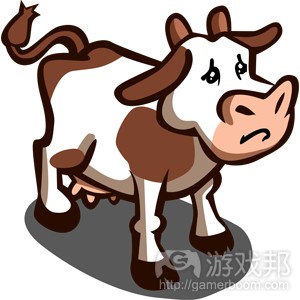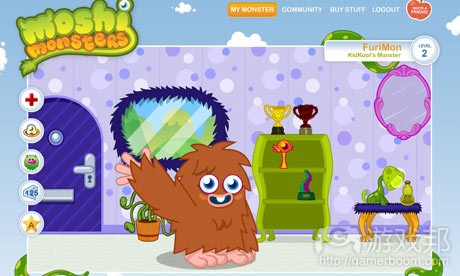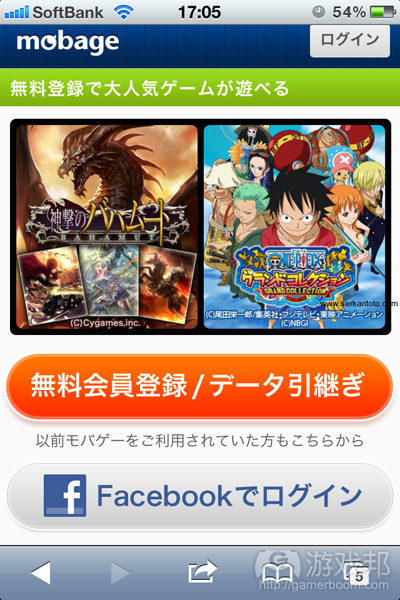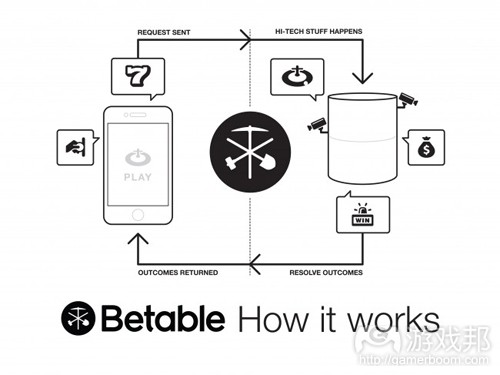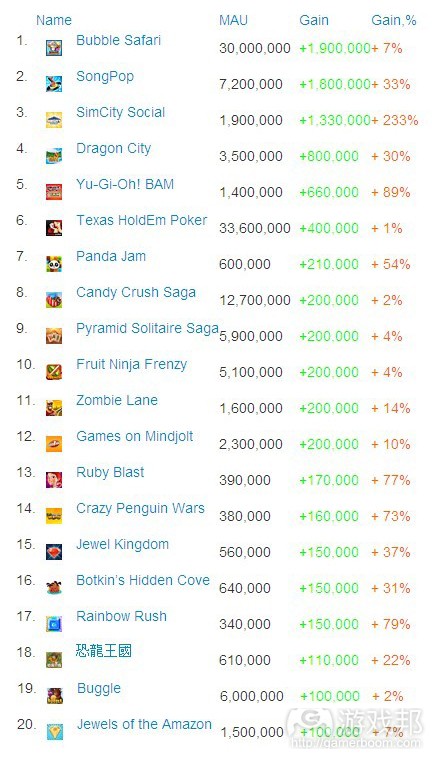每日观察:关注Zynga将关闭《FarmVille》iOS版本(7.10)
1)Facebook日前通过开发者博客宣布,Facebook App Center已增加7个开放服务国家和地区(游戏邦注:上个月仅向美国用户开发服务),这些国家分别是澳大利亚、加拿大、印度、爱尔兰、新西兰、南非和英国,这些地区的Facebook用户在所有Facebook用户中占比20%。
除此之外,Facebook还将于未来数周向巴西、法国、德国、俄罗斯、西班牙、台湾和土耳其市场的网页、移动平台开放服务,Facebook App Center将根据用户所在地区自动呈现当地使用语言。
2)据FarmVille Freak报道,Zynga将于8月1日关闭App Store中的《FarmVille》iOS游戏,并建议玩家通过HTML5游戏《FarmVille Express》在移动设备上体验这款农场游戏。
观察者称这并非Zynga关闭的首个项目,但却是该公司撤除的首款手机游戏。据称Zynga关闭这款iOS游戏可能是因为其玩家数量不足,不值得Zynga向其投放开发资源以持续更新内容。
3)儿童在线社区《Moshi Monsters》开发商Mind Candy近日收购英国工作室Origami Blue(由前迪士尼Black Rock Studios成员创办),以借此推进公司在儿童游戏领域的创新。
据报道Mind Candy未来有可能进行IPO,该公司目前已签署100多项授权合作协议。
4)据Serkantoto报道,日本社交游戏公司DeNA最近宣布旗下Mobage平台绑定Facebook功能,支持用户通过Facebook登录该平台,允许用户使用Facebook认证信息注册帐号,通过Facebook涂鸦墙分享游戏内容,并在Mobage平台中向Facebook好友发送信息以邀请其参与新游戏。
Serkantoto指出,Mobage美国平台早在6月中旬就已开始测试这项功能,Mobage日本平台绑定Facebook功能其实作用不大,因为Facebook在日本影响力有限,日本用户并不需要Facebook服务,甚至有许多人排斥Facebook;Mobage平台并未将Facebook作为指定支付服务供应商,因此用户仍只能购买Mobacoins以兑换虚拟道具。
5)据gamasutra报道,英国初创公司Betable日前宣布推出支持欧洲开发者将真钱赌博机制植入社交游戏的Betable平台,为开发者创造新收益来源。
但该公司尚未透露具体收益抽成方案,仅表示其抽成标准与其他平台不相上下。
Betable平台现在仍处于内测阶段,仅向允许在线赌博行为的地区开放服务。该公司计划瞄准西欧市场,近期尚无法支持美国市场,因为后者的相关在线财博法律规定更为严格。不过这些地区的开发商仍可使用该平台向允许在线赌博的地区运营游戏。
6)在本周的MAU增长最快Facebook游戏榜单上,Zynga游戏《Bubble Safari》再次登顶,新增190万MAU,增幅为7%。
FreshPlanet音乐问答游戏《SongPop》位居第二,新增180万MAU,增幅为33%。EA新作《模拟城市社交版》于上周结束测试,新增130万MAU,增幅达233%;SocialPoint游戏《Dragon City》新增80万MAU,增幅为30%;Konami游戏《Yu-Gi-Oh! BAM》新增66万MAU,增幅为89%。
Zynga新游戏《Ruby Blast》新增17万MAU,增幅为77%;Digital Chocolate游戏《Crazy Penguin Wars》新增16万MAU,增幅为73%。(本文为游戏邦/gamerboom.com编译,拒绝任何不保留版权的转载,如需转载请联系:游戏邦)
1)Facebook’s App Store–er, App Center–goes global (in English)
by Joe Osborne
Facebook’s newest scheme to help players discover new games–and for “users” to discover new boring apps–has gone global to seven additional countries around the world. The Facebook App Center launched last month solely in the U.S., but according to the Facebook developer blog, that only accounts for about 20 percent of the overall Facebook user base. And now, to take over the world!
Well, at least Australia, Canada, India, Ireland, New Zealand, South Africa, and the United Kingdom to start. Facebook’s Drew Hoskins writes “Brazil, France, Germany, Russia, Spain, Taiwan and Turkey” are up next in the coming weeks. Of course, this goes for both Facebook on the web and on mobile devices.
What’s interesting about this global push is that, depending upon where the user (or player) is based, the App Center will attempt to automatically display the app (or game) in the viewer’s native language. What most likely hasn’t changed is how the App Center works, which you can learn all about right here … with our opinions, naturally.(source:games)
2)Shriveled up: Zynga puts FarmVille on iOS out to pasture in August
by Joe Osborne
Anyone have an Unwither handy? Wait, stop looking–no amount of Unwither will help FarmVille for iOS now. Zynga has decided to cut the cord on the original, mobile app version of its farming simulator, according to FarmVille Freak. The below image gives FarmVille for iOS a mere 23 days before it meets its maker on Aug. 1, and it’s no longer listed on the App Store.
Of course, Zynga suggests players pick up where they left off using FarmVille Express, the HTML5-powered companion app to the Facebook game that lets players manage their farms. This is far from the first Zynga game to close, but it appears to be the first mobile game for the developer to pull the plug on. For it to be tied to the game maker’s flagship franchise only makes it sting that much more.
As for the “why”, it’s likely a matter of return on investment. FarmVille on iOS probably didn’t have enough regular players–to Zynga standards, at least–to warrant pumping development resources into for updates and general upkeep. It’s a shame, really, considering this was one of the few Facebook games gone mobile that actually brought in player’s progress from Facebook. Perhaps that’s not what the average player is looking for? We’ve reached out to Zynga for comment.(source:games)
3)Mind Candy pushes for innovation in kids’ games with new acquisition
by Mike Rose
Moshi Monsters creator Mind Candy has acquired a Brighton, UK-based studio founded by ex-Disney Black Rock Studios staffers, as a means of pushing innovation in kids’ games.
Origami Blue has now brought its Candy Labs innovation initiative to Mind Candy, and will continue to experiment with new ideas and concepts for children’s games, while also expanding on the company’s character animation.
The move comes as Mind Candy founder Michael Acton Smith looks to the future, and the possibility of an initial public offering. The London, UK-based company has signed over 100 licensing deals to date. (source:gamasutra)
4)DeNA Makes It Official: Mobage Starts Connecting With Facebook [Social Games]
by Dr. Serkan Toto
Big news from DeNA today, and I’ll get right to it: the company just officially announced in Japan that Mobage now connects with Facebook.
This is huge. The press release is relatively curt (and available in Japanese only), as this isn’t exactly great news for DeNA (I’ll come to that in a minute).
DeNA explains that Mobage:
•now accepts Facebook logins
•allows new user registration with one’s Facebook credentials
•lets users share game information on Facebook walls
•and lets users write messages to Facebook friends from within Mobage, i.e. in order to invite them to new games.
I just checked my Japanese Mobage account. After logging out, users accessing the top page now see this.
Observe how big the Facebook button is:
In Japan, where tens of millions of people already have Mobage accounts and Facebook isn’t that popular (yet), this will barely have an impact.
But the big bullet point is that Mobage in the US started accepting Facebook logins around mid-June. I noticed when I fired up Rage Of Bahamut in English on my iPhone a few weeks ago.
The picture below shows that the Facebook button in Rage Of Bahamut in English is even placed ABOVE the Mobage button (again, I took this shot about 3 weeks ago):
In other words, DeNA first (very quietly) tried out the Facebook connectivity outside Japan before expanding it into their home market and suddenly making it official today – in Japan.
From a PR perspective, this doesn’t make any sense.
My interpretation here is that DeNA didn’t see enough adoption of the Mobage network outside Japan and introduced the Facebook connectivity to simply have more people sign up. Clever that they now expand this option to Japan and let DeNA in Tokyo announce the move first, making it look like this wasn’t the direct motivation.
Again: Facebook isn’t that big in Japan, and even if they were, DeNA has strong branding power and penetrated the local market already: this isn’t for Japanese users. They don’t need Facebook connectivity, and a lot of them of would even decide against it (there is a reason why DeNA – in Japan – consciously markets Mobage’s virtual social graph).
So “DeNA International” finally caves in and gives part of the branding, user experience and user interaction away to Facebook. At least one important factor remains unchanged: users will still need to purchase Mobacoins to pay for virtual items (Facebook wasn’t chosen as a payment provider).(source:serkantoto)
5)New app program promises to bring real-money gambling to social games
by Tom Curtis
If you’ve been eyeing the social space over the past several months, you might have noticed that major players like Zynga have expressed interest in expanding their business beyond in-app purchases, and into the realm of real-money gambling.
It’s a sticky business to get into thanks to the myriad legal restrictions in place, but on Monday the UK startup Betable announced that it plans to help social developers get around those hurdles with a brand new game platform.
Currently in private beta, the Betable platform allows European developers to implement real-money gambling features into their games, and the company claims it could potentially open up new revenue streams that the social space hasn’t yet been able to tap into.
Betable declined to share exactly how much of a cut it will take from developers using its program, though company founder Christopher Griffin told us that the revenue split will be “similar to what developers have come to expect from other platforms.”
Right now, the Betable program is only available in select countries where local laws permit online wagering. While Betable could not provide us with a full list of its supported territories, the company noted that it particularly plans to focus on growing its platform within Western Europe.
Games in other regions, such as the United States, however, won’t be able to support Betable’s program in the foreseeable future, as strict regulations in these territories prevent companies from employing online betting altogether. Developers operating in these regions can still use Betable’s platform, but their games can only use real-money gambling in the territories where such practices are legal.(source:gamasutra)
6)Bubble Safari on top of this week’s fastest-growing Facebook games by MAU
Mike Thompson
Zynga’s Bubble Safari is once again at the top of the list of fastest-growing games by monthly active users, taking the top spot with 1.9 million MAU for a 7 percent gain this week.
FreshPlanet’s music trivia title SongPop took the No. 2 spot with 1.8 million MAU, up 33 percent. EA’s SimCity Social came out of beta on Facebook last week and seems to be taking off; the game took in 1.3 million MAU for a 233 percent gain. Social Point’s Dragon City brought in 800,000 MAU, a 30 percent increase. Konami’s Yu-Gi-Oh! BAM gained 660,000 MAU, an 89 percent gain.
Four other games on the list had gains greater than 50 percent. SGN’s Panda Jam is continuing to grow, up 210,000 MAU for a 54 percent increase. Zynga’s newly-released Ruby Blast took in 170,000 MAU, a 77 percent gain. Digital Chocolate’s Crazy Penguin Wars acquired 160,000 MAU, a 73 percent increase. Finally, SGN’s Rainbow Rush was up by 150,000 MAU for a 79 percent gain.(source:insidesocialgames)


























